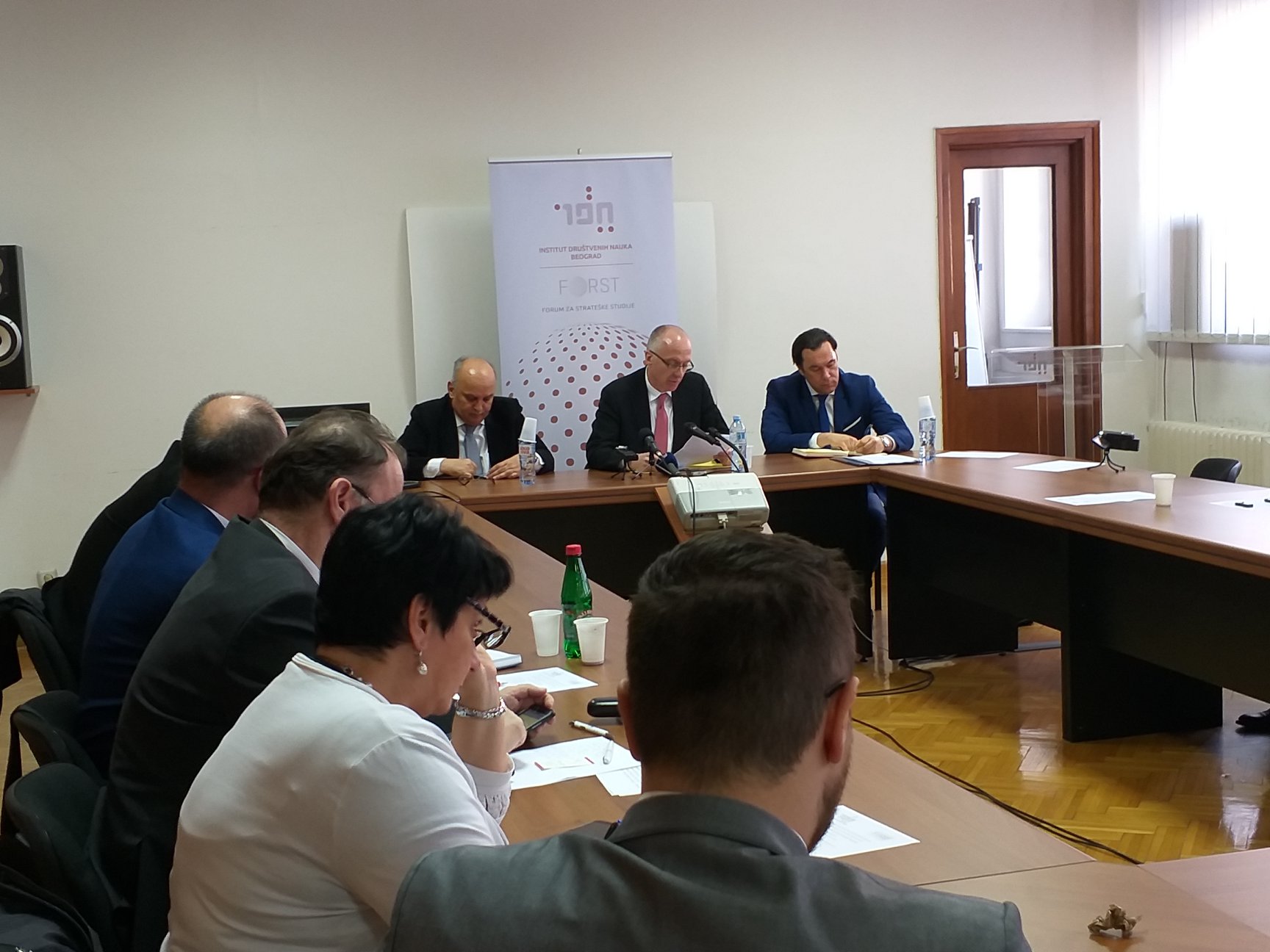The Forum for Strategic Studies (FORST) was presented to the public and the media for the very first time in Belgrade on February 19, 2019, at the conference World in Turmoil and the Future of Europe and the Balkans, attended by the Minister of Foreign Affairs of Serbia and some of the most prominent and important representatives of diplomatic corps in Serbia, together with prominent individuals in the field of media, cultural and public life.
The event was opened by Dr. Neven Cvetićanin, President of the Forum for Strategic Studies (FORST), who presented the reasons for the formation of such organization, the vision of developing FORST as an elite think tank in international relations, foreign policy, diplomacy, geopolitics and strategic studies, as well as future programs and projects of the organization. In that sense, he spoke about the plan of Forum for Strategic Studies to be the host and organizer of a large annual strategic conference called Strategic Streams, which would discuss, every year, the most important strategic event affecting Europe and European policy in a that year, with qualified speakers from the world, Europe and the region. Dr. Cvetićanin emphasized the ambition of the Forum for Strategic Studies to become a gathering place for professional and qualified people from the world, the region and Serbia, who will constructively explore international relations, geopolitics and diplomatic trends, gathering prominent world and regional experts in these fields.
The Minister of Foreign Affairs of Serbia, Ivica Dačić, also addressed the audience, emphasizing that the world, including the Balkans, are facing various challenges, and that Serbia strives to pursue a proactive and clearly profiled foreign policy. According to Dacic, Serbia stands for international relations based on the achieved norms of civilization and international law. Dacic stated that Serbia’s foreign policy is adjusted to the needs, interests and goals of our country:
“Serbia strives to pursue a proactive, clearly profiled and designed foreign policy that contributes to its better positioning at the regional, European and wider international level, and its foreign policy goals include preserving the country’s sovereignty and territorial integrity”, Dacic said.
He pointed that priorites of foreign policy of Serbia are: the continuation of the negotiation process with the EU and the realization of full membership in the near future, the development of bilateral relations with leading international actors, as well as with all other countries in the world.
“Preservation of peace and stability in the region, good neighborly relations and military neutrality are also among the foreign policy principles of our country,” he pointed out.
Dacic said that Serbia stands for international relations based on the achieved norms of civilization and international law.
He added that Serbia has good and stable relations with all major powers, while with most countries in Africa, Asia, Latin America and the Caribbean Serbia seeks to open the way for wider political and economic cooperation, in order to overcome the narrow, “Eurocentric”, foreign policy.
“Serbia is continuously making an active contribution to world security and stability by participating in military and police multinational operations”, Dacic said, reiterating that Serbia’s strategic goal remains full membership in the European Union.
Although Serbia has made great progress on the path to membership, the issue of EU enlargement at this moment, however, depends more on the Union itself, Dacic said.
“Internal problems and reforms in the EU will show how capable this integration will be for acception of new members. The attitude towards enlargement will primarily be an indicator of the vitality and sustainability of the EU itself. Marginalization of EU enlargement policy and uncertainty about process dynamics, as well as the overall prospects of membership for the candidate countries, has a great negative impact on the developments in the region of the Western Balkans“, Dacic emphasized.
Our country is committed to the development of good neighborly relations and dialogue, as a basic tool in resolving open issues among neighbors, says Dacic and says that is why Serbia actively participates in the work of regional initiatives, thus confirming its position as a proactive participant and inspirer of expanding and deepening regional cooperation.
“Serbia is determined to promote a ”positive agenda“ in relations with its neighbors and countries in the region – oriented towards the future. We strive to focus on the development of economic and other types of cooperation in relations with all countries in the region”, he stressed.
Dacic said that in today’s world, in addition to traditional instruments of force – military force – industrial, technological and economic potential, informatics, internet, robotics, artificial intelligence, biotechnology and other phenomena of the “fourth industrial revolution” are playing an increasing role in the international position of states or regions.
The world, Europe and the Balkans are facing various challenges – demographic, climate, technological, security, social, economic and other changes that affect the position of states, their strength, influence, mutual ties, and thus the character of international relations, he said.
He stated that the fragmentation of the international system, the weakening of multilateralism and the increase in the confrontation between the three largest world powers were also discussed at the just held Munich Security Conference.
His Excellency Thomas Schieb, Ambassador of the Federal Republic of Germany to Serbia, also addressed the audience, talking about relations between Germany and Serbia, trends within the European Union and possibilities for its enlargement, as well as possible relations between the Western Balkans and the European Union in coming years.
The audience was also addressed by prof. Dr. Dejan Šoškić, former Governor of the National Bank of Serbia and full professor at the Faculty of Economics in Belgrade, Zoran Panović, program director of DEMOSTAT and H.E. Igor Davidović, former Ambassador of Bosnia and Herzegovina to the United States, the EU and the OSCE.
Event was attended by representatives of the printed and electronic media, as well as prominent personalities from the public, cultural, academic and scientific life of Serbia and the region.

